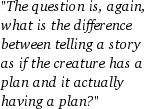Consciousness in Humans and Elsewhere
Barry Blumberg, Ph.D.
page 4 of 4
These are what can only be called ingenious methods employed by HBV to  increase the probability of its survival. I, and probably most other workers in the field, would not have thought of these strategies had we not been “informed” by the study of HBV’s behavior. To put this in a more anthropomorphic[1] style, the virus is smarter than we are.
increase the probability of its survival. I, and probably most other workers in the field, would not have thought of these strategies had we not been “informed” by the study of HBV’s behavior. To put this in a more anthropomorphic[1] style, the virus is smarter than we are.
In preparing this paper, I have found a few other references to similar questioning in quite different fields, such as information technology. The following example envisions a future internet where questions similar to those that I have posed are raised. This is a quote by Verner Vinge, who is at San Diego State University. Vinge is the author of the novel, Rainbows End, which considers the Internet of 2025.
“In fifteen years, we are likely to have processing power that is 1,000 times greater than today, and in even larger increase in the number of network-connected devices (such as tiny sensors and effectors). Among other things, these improvements will add a layer of networking beneath what we have today, to create a world come alive with trillions of tiny devices that know what they are, where they are and how to communicate with their near neighbors, and thus, with anything in the world. Much of the planetary sensing that is part of the scientific enterprise will be implicit in this new digital Gaia (Mother Earth). The Internet will have leaked out, to become coincident with Earth. … The ensemble eventually grows beyond human creativity. To become what? We can’t know until we get there.”[2]
The point of this article is to ask an interesting question. Consciousness implies self awareness. Knowing that you exist requires considering the past, present, and the future. Considering the future means that plans must be made based on past and present experiences and unfolding events.
In describing the natural history of HBV and its interactions with humans and other elements in its environment, I spoke as if it had a plan that is a characteristic of consciousness. The question is, again, what is the difference between telling a story as if the creature has a plan and it actually having a plan?
 Blumberg, Baruch Samuel, 1925–, American biochemist, b. Brooklyn, N.Y., B.S. Union College, Schenectady, N.Y., 1946, M.D. Columbia, 1951, Ph.D. Oxford, 1957. From 1957 to 1964, he worked at the National Institutes of Health. In 1964, he became a professor at the Univ. of Pennsylvania, and in 1976 he shared the Nobel Prize in Physiology or Medicine with D. Carleton Gajdusek. Blumberg won his share for his discovery of an antigen in the blood of an Australian Aborigine that contributed to the development of a vaccine against hepatitis B. In 1999, he was named director of NASA's Astrobiology Institute. Barry Blumberg is the President of the American Philosophical Society.
Blumberg, Baruch Samuel, 1925–, American biochemist, b. Brooklyn, N.Y., B.S. Union College, Schenectady, N.Y., 1946, M.D. Columbia, 1951, Ph.D. Oxford, 1957. From 1957 to 1964, he worked at the National Institutes of Health. In 1964, he became a professor at the Univ. of Pennsylvania, and in 1976 he shared the Nobel Prize in Physiology or Medicine with D. Carleton Gajdusek. Blumberg won his share for his discovery of an antigen in the blood of an Australian Aborigine that contributed to the development of a vaccine against hepatitis B. In 1999, he was named director of NASA's Astrobiology Institute. Barry Blumberg is the President of the American Philosophical Society.
Footnotes
1. Anthropomorphic - suggesting human characteristics for animals or inanimate things. Answers.com August 24, 2006 4:47PM EST (back to top)
2. Vinge, Vernor, The Creativity Machine, Nature, (2006), 440, 411. (back to top)